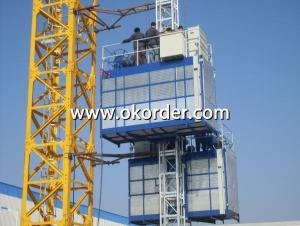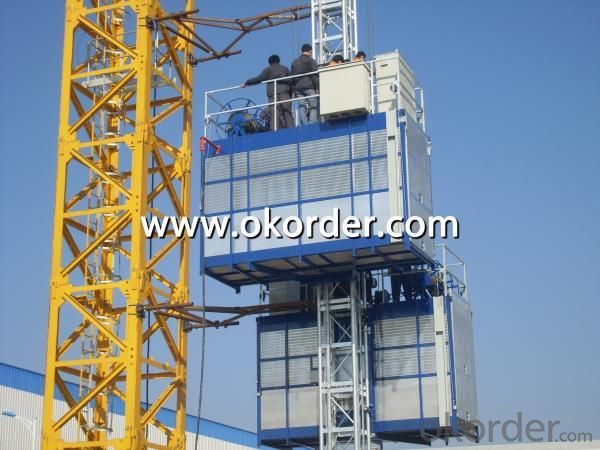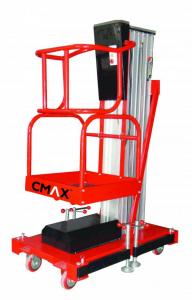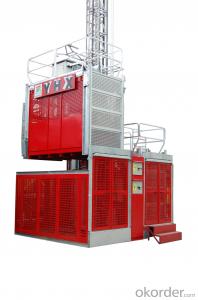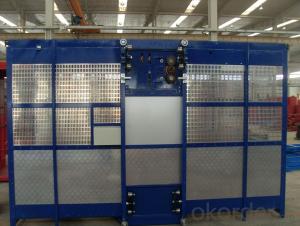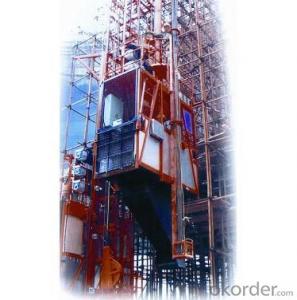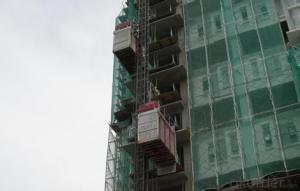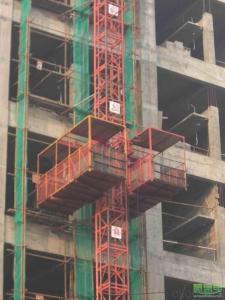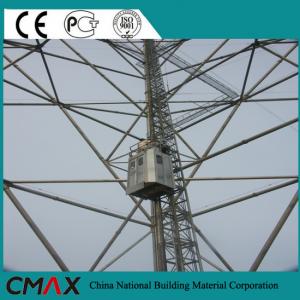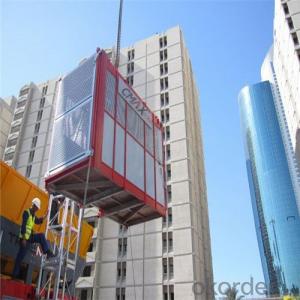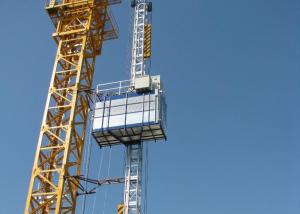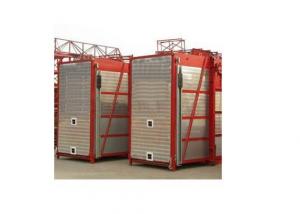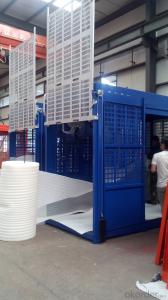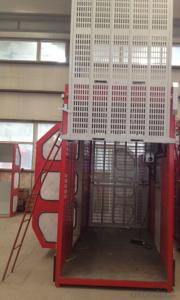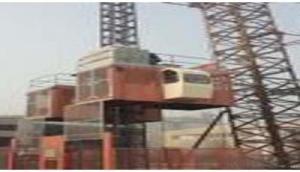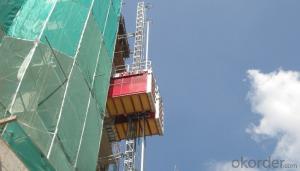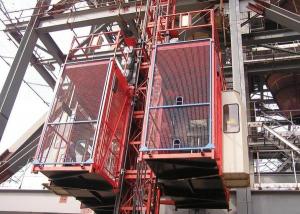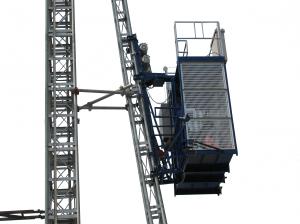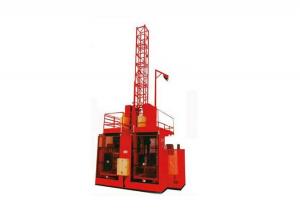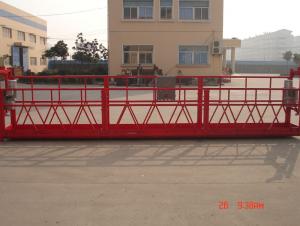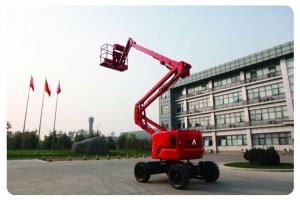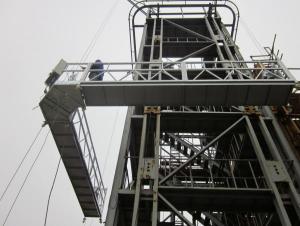Building Hoist SC200/200
- Loading Port:
- China Main Port
- Payment Terms:
- TT or L/C
- Min Order Qty:
- 1 Set set
- Supply Capability:
- 100 Sets Per Month set/month
OKorder Service Pledge
OKorder Financial Service
You Might Also Like
Building Hoist Description SC200/200
Condition: New
Application: Construction
Payload(kg):2*2000
Lifting Speed(m/min):0~60
Motor Power(kw): 2*3*22
Safety Device: 2*SAJ50-1.4
Cage: Single/double cages
Counterweight: No
Certification: CE/ ISO
Place of Origin: China(Mainland)
Model Number: Type:SC200/SC200
Packaging & Delivery of Building Hoist
Packaging Detail: Nude package Delivery Detail: 25days
Main Parts of Building Hoist
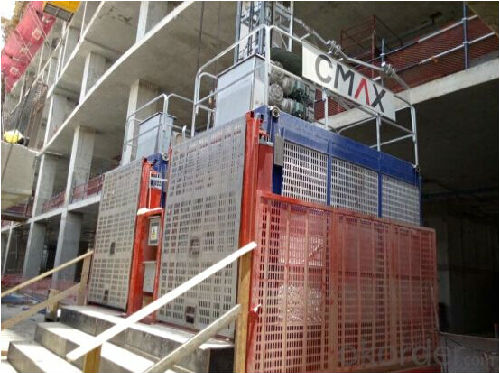
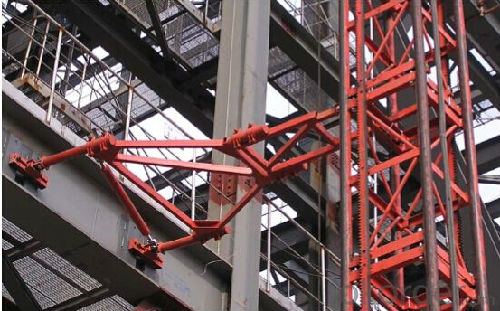
Feature:
● Adopts the most advanced VF speed control device and microcomputer programmable logic controller.
● eliminate the concussion during start up and braking, steady the operation process,
and ensures automated leveling.
● the speed control precision can reach ±2~3%. Realizes accurate low speed positioning of the hoist and avoid slipping during downward stopping of hoist.
● Thesystem has current-restriction function, ensuring a small current when motor start up . It reduces the engery consumption and mitigates effects to on site electric equipments.
● The system also has the over voltage protection,low voltage protection, overcurrent, overload and protection functions,
● The system applies the special software for hoists developed by our company, making the operation reliable.
Building Hoist Specifiction
FAQ of Building Hoist
Q: What is the building hoist main purpose?
A: Building hoist equipped with double or single cabin to transport the materials and labors up and down. It's the ideal
construction equipment for vertical transportation in the field of construction.
Q: What is the main structure of building hoist?
A: The P/M construction hoist mainly contains metal structure, driving system, electrical control system,
Q: What is the meaning of the building hoist’s code?
A: Take for example: “SC” stands for rack and pinion hoist, “200/200” stands for double cage and capacity
is 2 tons per cage. “” stands for single cage and capacity is 2 tons.
Q: What is the dimension of the cage?
A: Normally the cage dimension is 3X1.5X2.5M for 2t type hoist. Details should be checked according to our
quotation sheet. Also, the size can be customized according to the factual site condition. There are two doors for each cage, It can be produced
- Q: This question asks for a comparison between electric and manual lifting equipment, highlighting their distinct features and operational differences.
- <p>Electric lifting equipment, such as electric hoists and cranes, operates using electrical power and is designed for heavy-duty lifting and repetitive tasks. It offers high efficiency, ease of use, and often requires less physical effort from operators. On the other hand, manual lifting equipment, like levers, pulleys, and manual hoists, relies on human power and is typically used for lighter loads or in situations where electrical power is not available. Manual equipment is generally more portable and requires no power source, but it is slower and more labor-intensive. Electric equipment is more suitable for industrial settings, while manual equipment is often used in smaller-scale operations or for temporary tasks.</p>
- Q: This question asks if single-rope lifts can experience malfunctions or create safety risks.
- <p>Yes, single-rope lifts can malfunction and pose safety hazards. Like any mechanical system, they are subject to wear and tear, component failure, and human error. Factors such as inadequate maintenance, poor weather conditions, and operator negligence can lead to malfunctions. Safety hazards may include rope breakage, sudden stops, or even derailment. However, modern lifts are equipped with multiple safety features such as emergency brakes and redundant systems to minimize these risks and ensure passenger safety. Regular inspections and adherence to safety protocols are crucial to prevent malfunctions and maintain the safety of single-rope lifts.</p>
- Q: The construction elevator always jumps
- The construction elevator of our construction site always jump at the start of the building, always can't find the reason, the reason that can be so, have a person encounter this thing But it used to be normal, and sometimes it's jump, start, jump, start, and sometimes you can do it over and over again,
- Q: This question asks for a comparison between lifting equipment used in indoor settings versus those used outdoors, focusing on their differences.
- <p>Indoor lifting equipment is designed for controlled environments, often smaller and more precise, with features like electric chain hoists or jib cranes. They are typically quieter, require less maintenance, and are suitable for tasks like assembly, manufacturing, and warehouse operations. Outdoor lifting equipment, such as gantry cranes or mobile cranes, is built to withstand harsh weather conditions, has higher load capacities, and is often used for construction, shipping, and heavy industry. These are more robust, may require more maintenance, and are designed for larger, heavier loads over uneven terrain.</p>
- Q: The safety officer shall be responsible for the work of the construction elevator
- In a nutshell, the security officer is responsible for overseeing, checking, training, maintaining, and dismantling
- Q: This question asks for a comparison of various types of electric building hoists, highlighting their unique features and differences.
- <p>Electric building hoists come in various types, each designed for specific applications. The main differences lie in their capacity, lifting speed, control systems, and construction. For instance, worm gear hoists are compact and offer precise control, suitable for light to medium-duty applications. Chain hoists are versatile with higher speeds and are ideal for general lifting tasks. Electric wire rope hoists are powerful and designed for heavy-duty lifting, often used in construction and industrial settings. Variable frequency drives in hoists allow for speed control, enhancing safety and efficiency. Each type has its operational advantages and limitations, making the choice dependent on the specific lifting requirements and environmental conditions.</p>
- Q: What are the pros and cons of utilizing hydraulic fluid within the system of a building hoist?
- <p>The advantages of using hydraulic fluid in a building hoist include smooth and controlled lifting, which reduces the risk of accidents. It also offers a compact design due to the high power-to-weight ratio of hydraulic systems. Additionally, hydraulic systems are known for their durability and low maintenance requirements. However, there are disadvantages such as the potential for leaks, which can be hazardous and costly to repair. The systems can also be sensitive to temperature changes, which might affect performance. Lastly, hydraulic fluids can be environmentally harmful if not properly managed, posing disposal challenges.</p>
- Q: What are the key safety rules and regulations that must be followed when operating a building hoist?
- <p>Safety regulations for using a building hoist include ensuring that the hoist is inspected and certified by a qualified person before use. Operators must be trained and certified. The hoist should be used only for its intended purpose, and load limits must never be exceeded. Regular maintenance and checks are required to ensure the hoist remains in good working order. Safety devices such as limit switches and emergency stops must be operational. The hoist area should be kept clear of obstructions, and warning signs should be posted. Personal protective equipment (PPE) must be worn by operators and anyone in the vicinity. Overhead protection should be provided to prevent objects from falling onto the hoist. Compliance with local and national regulations is also crucial.</p>
- Q: How does the construction elevator add up
- With the popularity of construction lifter to use, but knowledge of the user of this kind of special equipment, and makes the construction lifter in use process safety accident frequency is higher and higher, it is necessary to everyone together to discuss how to eliminate the safety hidden trouble as possible. This paper makes a concrete analysis on the use of the construction elevator during the use of the elevator.
- Q: This question asks about the typical issues encountered with construction hoists and seeks solutions to address these problems.
- <p>Common problems with building hoists include mechanical failures, electrical issues, safety hazards, and improper maintenance. Mechanical failures can be fixed by regular inspection and timely replacement of worn-out parts. Electrical issues are often resolved by checking wiring and connections, and using surge protectors. Safety hazards can be mitigated by ensuring all safety features are operational and by providing proper training to operators. Improper maintenance can be addressed by establishing a routine maintenance schedule and ensuring that all personnel follow safety protocols. Regular inspections, prompt repairs, and operator training are key to maintaining the functionality and safety of building hoists.</p>
1. Manufacturer Overview
| Location | Jiangsu,China |
| Year Established | 1990 |
| Annual Output Value | Below US$1 Million |
| Main Markets | Mid East;Southeast Asia;South America |
| Company Certifications | ISO 9001:2008; |
2. Manufacturer Certificates
| a) Certification Name | |
| Range | |
| Reference | |
| Validity Period |
3. Manufacturer Capability
| a) Trade Capacity | |
| Nearest Port | SHANGHAI |
| Export Percentage | 1% - 10% |
| No.of Employees in Trade Department | 300 |
| Language Spoken: | English;Chinese |
| b) Factory Information | |
| Factory Size: | Above 300,000 square meters |
| No. of Production Lines | Above 15 |
| Contract Manufacturing | OEM Service Offered;Design Service Offered |
| Product Price Range | Average |
Send your message to us
Building Hoist SC200/200
- Loading Port:
- China Main Port
- Payment Terms:
- TT or L/C
- Min Order Qty:
- 1 Set set
- Supply Capability:
- 100 Sets Per Month set/month
OKorder Service Pledge
OKorder Financial Service
Similar products
Hot products
Hot Searches
Related keywords
